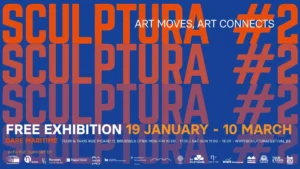
Olympe de Gouges I, Smoke-fired sandstone, bronze, pigments, 2016
On the occasion of International Women’s Rights Day, we are returning to the ‘encounter’ between the artist Cécile Raynal and a pioneering figure of feminism in France: Olympe de Gouges. This encounter has resulted in a series of sculpted portraits in which the artist wants to underline the contemporaneity of the engagements of this committed and determined eighteenth-century woman: “I sought to embody this symbolic figure, to show her as timeless and therefore current, beautiful rather than simply pretty, with a sensual intelligence but lacking in arrogance.”
La Dépêche Foundation’s commission
The artist’s work on Olympe de Gouges began when a call for tenders was sent out for a statue of the historical figure, to be installed at the National Assembly. Her design was ultimately turned down. In October 2016, a marble bust by Jeanne Spehar and Fabrice Glouxe was installed in the French institution’s Salle des Quatre-Colonnes. The same year, La Dépêche Foundation group, already familiar with Cécile’s work and her interest on the subject, decided to commission her for a series of small portraits. Only one of these portraits is still available and is currently for sale on Artistics.

Olympe de Gouges I, Smoke-fired sandstone, bronze, pigments, 2016
A while later, the same sponsor bought a large sized portrait of Olympe de Gouges to be exhibited permanently at La Dépêche du Midi newspaper’s headquarters, in Toulouse. Unveiled in 2018, the artwork was inaugurated on a symbolic date: March 8, International Women’s Day. “After Jaurès and Clémenceau, it is important for us to welcome this great woman who has shown determination, and born in our lands“, said Marie-France Marchand-Baylet, president of the Dépêche Foundation Groupe, when presenting the sculptress and her work during a reception at La Dépêche’s hall.

Cécile Raynal in front of the bust of Olympe de Gouges at La Dépêche du Midi. Photo: Ladepeche.fr
Cécile Raynal’s work on Olympe de Gouges
Marie Gouze, known as Olympe de Gouges (1748, Montauban – 1793, Paris) was a French woman of letters and politician, considered today as one of the pioneers of French feminism. An intellectual committed against the death penalty and the end of slavery, a women’s rights activist including the right to vote, she published the famous Declaration of the Rights of Woman and Citizen in 1791. Two years later, during Robespierre’s Terror, she was arrested and guillotined for having supported the Girondins political group.
As always with her work, Cécile Raynal throws herself into researching the character with passion. She wants to grab all main aspects to develop her portrait. She then met historians and read several biographies, descriptive texts as well as plays written by Olympe de Gouges. She was particularly inspired by the historian Olivier Blanc’s biography.

Olympe de Gouges II, Smoke-fired sandstone, bronze, pigments, 2017
Cécile Raynal sees Olympe de Gouges’ character as: “A visionary, a resistant who lost, but whose fight is still relevant today, for both men and women“. With her portraits, she wants to show a courageous woman, with a determined and proud character. Olympe de Gouges’ hair is long and loose on one side, a symbol of her characteristic insubordinate and free spirit, and short and chopped on the side where the guillotine fell on her. In one of the portraits, three urns are attached to the sculpture’s column-pedestal, identifying the text that sent Olympe de Gouges to prison: ‘The Three Urns, or the Salvation of the Fatherland, by an Aerial Traveller’, where she demanded the French people’s right to a referendum on their future government.
A word from the artist
“She (Olympe de Gouges) is described as being beautiful and flirtatious, obstinate, stubborn throughout her struggles and dignified before the scaffold. The portrait Kucharski left us, is of a woman sitting in a comfy seat, well dressed, composed, as she frequently was. But if Olympe de Gouges has become a symbol, if she is remembered after those fervent misogyny times during and after the revolution, and despite attempts over two centuries to prevent any credibility, it is because she is one of those beings who said: “No”, with conviction, philanthropy and audacity. And what is more, in the case of Olympe de Gouges, offered alternatives to the norms and standards of the times.

Portrait of Olympe de Gouges by Alexandre Kucharski (1741-1819)
Those who were rebellious and stood as equals to men in thought, spirit and expression and who defied history when it seeked to silence them. Those women who sometimes ran with Wolves. Those who thought with their heads, at the risk of losing it, not hotheads, but thinking heads. Women politicians, women in the shadows who tirelessly establish, beyond women’s interests, the equal rights and voting right, a condition for any so-called democratic system.
She now speaks to me. I wanted to give substance to this icon, a timeless figure and therefore current, a beauty without attractiveness, a sensual intelligence and without arrogance, as she was not born out of wedlock nor without nobility. She made it all up, irreverent and without vanity. Her neck is surprisingly long. The head held in a determined way. I kept the curly hair of the women from the revolutionary era, and the shawl that appears in the portrait painted by Kurchaski, as well as her dropped shoulders, typical of the portraits of this period. Her hair acts as a symbolic force, wild and a cut out mass, leaving her very long neck exposed. The vitality and decapitation of this bust appear at the same time. The same commitment. On stacks of newspapers finally, her tools, her weapons, and causes of her death”. Cecile Raynal





